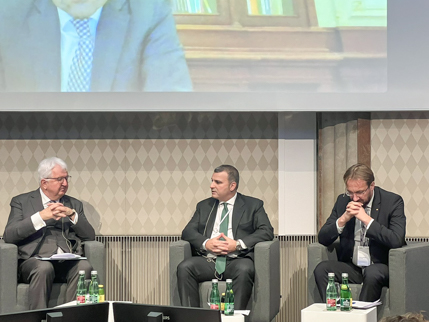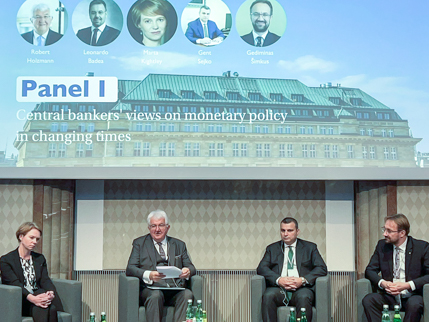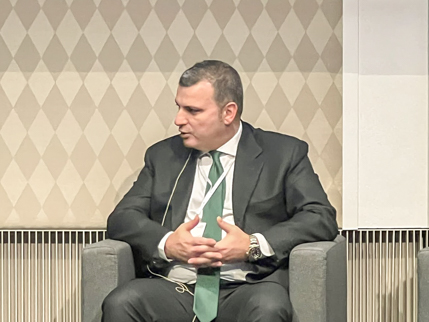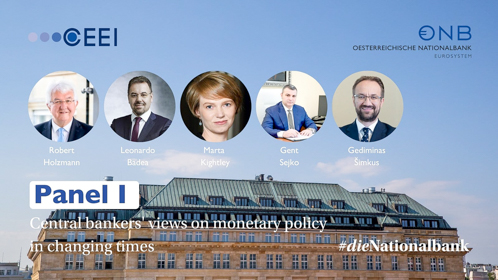BANK OF ALBANIA
PRESS RELEASE
Governor Sejko attends the Conference on European Economic Integration 2022, organised by Oesterreichische Nationalbank
Publication date: 22.11.2022
On 21 November 2022, the Governor of the Bank of Albania, Mr Gent Sejko, upon the invitation of the Governor of the Oesterreichische Nationalbank (National Bank of Austria), Mr Robert Holzmann, attended the European Economic Integration Conference 2022 on: “Economic and monetary policy under wartime conditions - implications for CESEE” held in Vienna. The conference was attended by representatives from central banks of CESEE countries, international financial institutions, and academic experts.

The aim of this conference was to analyse the impact of these transformational crises -the war in Ukraine, the effects of the COVID-19 pandemic, and climate changes - on the economies of Central, Eastern and Southeastern Europe (CESSE). While differing in nature, these crises all have a decisive effect on economic and monetary policy.
The conference addressed: the impact of the strained geopolitical situation on the CESEE economies; the challenges presented by a rising inflation; demographic issues; the current energy crisis; and the restructuring toward renewable energy sources and alternative suppliers.

Governor Sejko was invited to speak in the panel: “The central bankers’ views on monetary policy in changing times.” Discussions in this panel focused on: the challenges of the global economy from rising prices and uncertainties; the role that monetary policy, fiscal and financial policies have in the stabilisation of the situation; analysis of potential risks to the economic activity and financial stability etc.
In this context, the Governor focused on the inflation issue in Albania and the reasons why this indicator is relatively lower compared with the regional countries. He emphasized that akin to other countries, Albania is also being affected by a rising inflation, which reached at 8.3% in October. However, inflation rate is among the lowest in the region, whereas the other part of the Western Balkan countries record an average inflation rate of around 16%.

Also, Governor Sejko stressed out that, in contrast to most regional countries, the nominal exchange rate in Albania has continued to appreciate, in turn mitigating the transmission of external price shocks to the domestic economy. During 2022, our currency, the lek, has appreciated by 2.5% on average against the euro, due to significant revenues generated by tourism, high FDIs, and stable risk premia in our domestic financial markets. This was further strengthened by the convergence of our monetary policy cycle with that of the euro area. In parallel, the regulated energy price for Albanian households has helped in absorbing the foreign pressures.

Faced with strong and persistent inflationary pressures, Governor Sejko highlighted that the monetary policy should be steered toward preserving price stability, as a precondition for the financial stability and the stable economic growth in Albania, over the long run. Given the circumstances, the Bank of Albania has undertaken a gradual monetary policy normalisation process, ensuring that the speed of the normalisation will return inflation to target within a reasonable period of time and with the lowest cost possible to the economic activity. Also, Mr Governor explained that projections in the baseline scenario suggest that the Albanian economy will continue to grow and the domestic financial stability will remain unscathed, even as the normalisation of the monetary policy stance is underway.
Paying particular attention to the financial stability, the Governor said that analyses show a liquid banking sector, which is well-capitalised and resilient against shocks, corroborated by both the baseline scenario as well as adverse scenarios. This resilience reflects, inter alia, the positive effects of structural reforms undertaken in regards to improving the banking supervision and regulation, the consolidation of the banking sector, the strengthening of security networks, as well as the improvement of internal control systems of banks.
To this end, Governor Sejko ensured that the Bank of Albania will continue to remain attentive toward any potential financial stability risk, and will aim to undertake the necessary measures in a timely manner. The broad experience that the Bank of Albania has gained from managing shocks in the past, provides an additional guarantee to the banking sector and the Albanian economy itself.

 Linkedin
Linkedin
 Twitter
Twitter
 Youtube
Youtube
 Facebook
Facebook
 Flickr
Flickr
 RSS
RSS
 Subscribe
Subscribe
 Feedback
Feedback